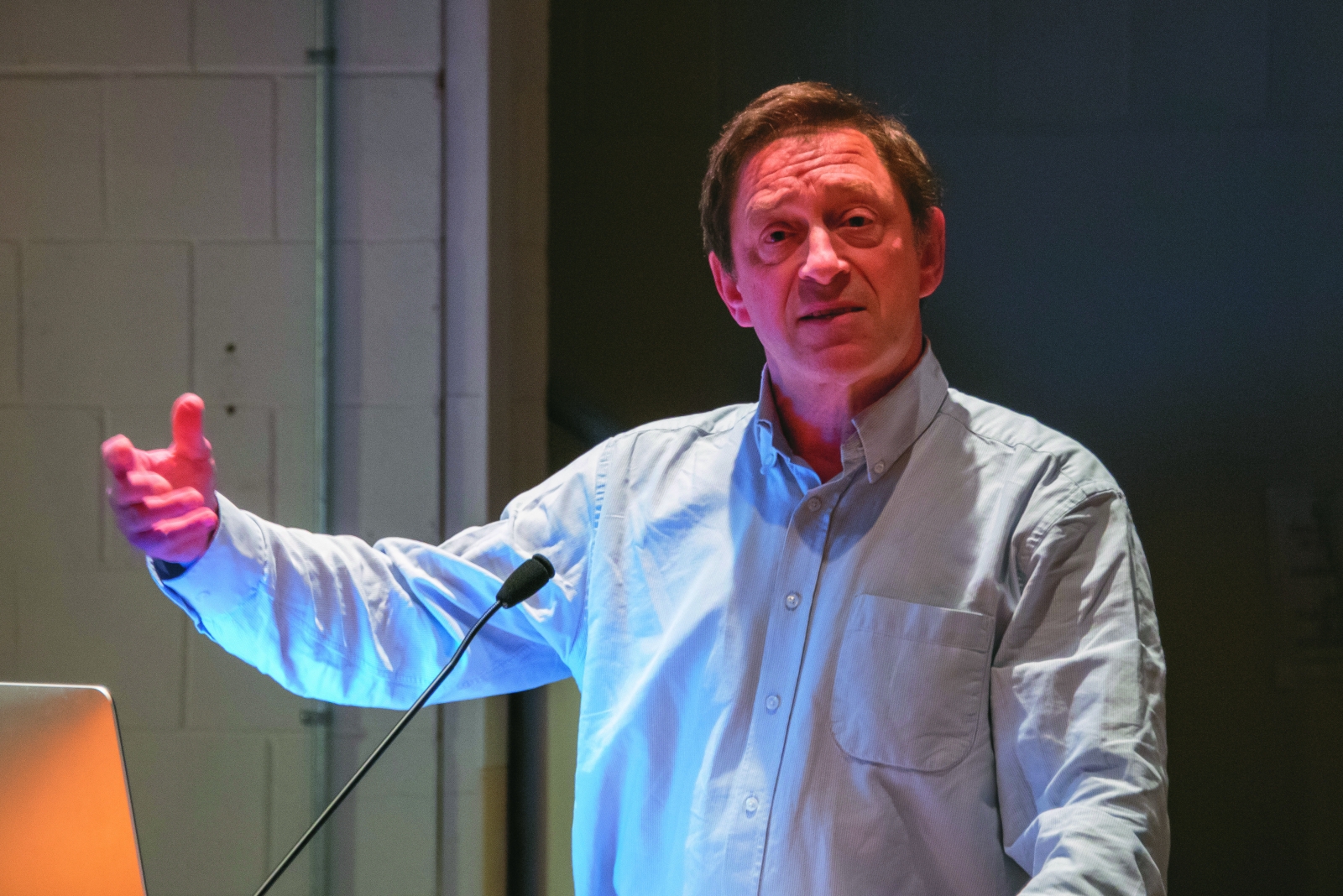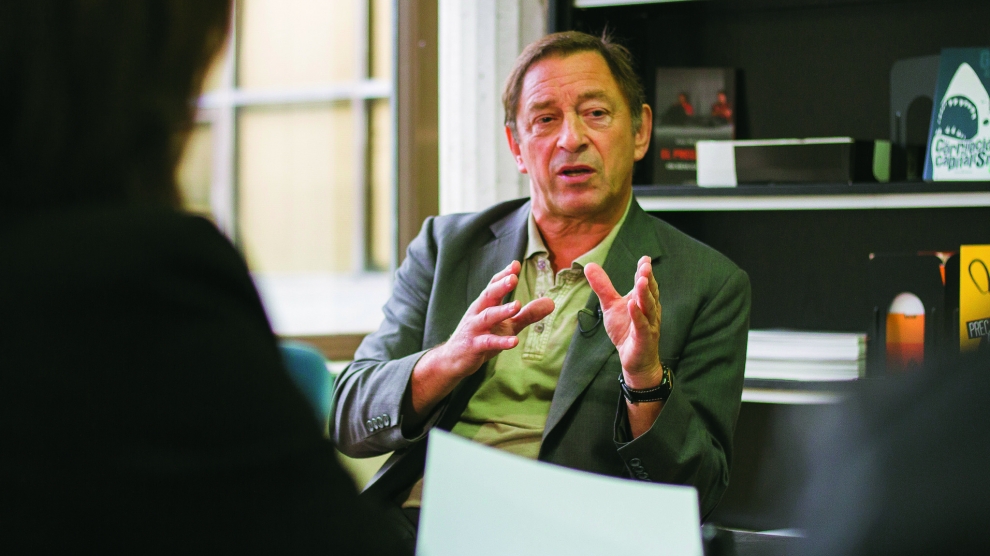Andrew Wrobel (AW): What is happening in Europe now?
Guy Standing (GS): That’s a big question. For some years I’ve been analysing the growth of the precariat, a social class formed by people suffering from precarity, which is a condition of existence without predictability or security, affecting material and psychological welfare.
In 2011, I predicted that, unless the insecurities of the precariat were addressed, and given priority by politicians and political parties, we would see the emergence of a political monster. It doesn’t give me any pleasure that today, sure enough, we’re seeing a drift to a neo-fascist, right-wing, authoritarian, nationalistic, reactionary politics. But it is what you would expect if you leave too many of your people in chronic insecurity, in a precariat in which they don’t feel that they’re going anywhere and are being reduced to “supplicants.” They don’t have any rights; they have to ask for favours all the time. They worry about their debts, worry about their future, their present, and that of their families.
We do have these authoritarian movements now and they are being backed by the plutocrats and financiers who want to preserve the gains that they’ve been making in economic terms. But at the same time, I’m not pessimistic. We’ve learned from our histories, from what happened in Europe in the 1930s. We never want to see that again, nor the nasty state socialism or whatever you want to call it of the Stalinist era. None of us should want to go back to either of those dystopias.
AW: So there is nothing to worry about?
GS: Well, I think we have a vacuum in our political structures at the moment where the old left responses are dead men walking. In the French presidential election, the socialist party candidate got 6 per cent, whereas previously the socialists won the presidency. We’re seeing it everywhere. We’re seeing it in Britain. We saw it with the Democrats in the United States.
We also have a politically unstable situation in central and eastern Europe. Poland has its own problems, with an authoritarian streak, a very illiberal set of tendencies. I worry about the norm-driven religious influence. I’m not religious myself, but I’ve always thought one should be tolerant of all religions. If you become doctrinaire and dogmatic with your religious views and that translates into dogmatic social policies, then that becomes very worrisome.
We have to have a new progressive politics, and for it to have any chance of success, it must be based in the emerging mass class, the precariat. This is the emerging majority of people in terms of how they have to live, how they’re trying to live, and the insecurities that they are facing. The new progressive politics must not be like the old left politics. In each era, each period of history, you have to have a new agenda for what it means to be a progressive. I think we are at a very interesting stage when the old so-called “left” is being pushed off the stage. The new precariat politics is just taking shape.

AW: What is shaping up in front of us?
GS: In my book A Precariat Charter: From Denizens to Citizens I have 29 policies, which I think would amount to a set of policies that would suit the precariat. It includes recognising that the work we want to do, the work that we need to do to develop ourselves as citizens, as caring people, is different from what’s been happening in the labour market. We need more control of our time in order to pursue that sense of work, which is developing ourselves.
AW: Doesn’t that sound a bit utopian?
GS: I don’t think it is a utopian ideal. It’s a matter of having policies which reduce the chronic income losses that people in the precariat are experiencing. This is the theme of my other book The Corruption of Capitalism. The old income distribution system has broken down. What that means is that the share of national income going to capital is rising. The share of national income going to labour is falling. That’s happening in China, in the United States, in Britain, elsewhere in Europe, everywhere, because the system is automatically tending to give more and more income to capital and to property owners.
If that’s the case, then it’s not a matter of calling for higher minimum wages or more power for trade unions. They’re desirable, but they’re not going to fundamentally change the distribution of income. There has to be a new system and a part of the new system should be a basic income for everybody. A basic income would give people basic security and people who have basic security have more mental stability, more control over their mental development. Psychologists have taught us that. We don’t need more evidence; if you have chronic insecurity, mental health deteriorates.
We have to start by dismantling rentier capitalism, which is giving more and more income to owners of property, including intellectual property and financial assets. This is not producing more goods and wealth and happiness for people. We must therefore take some of that income and share it around society. Also, it is not healthy to have these plutocrats, oligarchs, billionaires and multi-billionaires because excessive money leads to excessive corruption.
AW: I am not sure those who benefit from the current situation would like to have that taken away from them.
GS: We have a crisis of inequality and the precariat. But I have strong, optimistic feelings that we can encourage and participate in a precariat revolt. Note that I use the term “revolt” not “revolution.” I’m not calling for a revolution. A revolt is when the group grows in number and says, “You make the changes. We’ll make the changes. We will stand. We will do it.” I think that will happen in the next five to 10 years. I hope so. We’ll see, but I’ve got a sneaking feeling that there’s a lot of energy out there.
AW: We have seen large numbers protesting recently in Poland, Romania.
GS: The demonstrations that you’re referring to in Romania have been mirrored in Spain. They’ve had a lot of demonstrations against the “casta.” The demonstrations have been mirrored in the United States. They’ve been mirrored in various other places. I call these sorts of demonstrations the protests of primitive rebels. A primitive rebel, in my imagery, is someone who knows what they’re against, but they don’t know what they’re for.
Now you always need a stage in a transformation when primitive rebels start to stand up. It’s the Robin Hood type thing. I think that is a necessary phase in leading more people to understand the structures that they’re existing in and understand their own sense of where they are, or where they aren’t. What’s happened with many of these demonstrations — the Arab Spring, the Indignados, the Occupy Movement — is a growing sense of what sociologists call agency that’s also been developing a sense of identity.
Instead of feeling sorry for themselves, people are starting to say, “I’m part of the precariat. I need to stand up. This is a structural thing that’s creating these conditions and we need to oppose these structures.” We. So you have the development of a “we.”
AW: A sense of a community? A common goal?
GS: A sort of class consciousness. You don’t have to use a pure Marxist interpretation. But a sense of, “I belong to a social group and that social group is a big one.”
The demonstrations that we’re seeing, it’s partly resisting cultural erosion, an ugly, countercultural movement, but underneath it also has economic and political dimensions. I think that’s an important part of what’s taking place. There have been hundreds of protests, elective protests, since 2008 all over Europe.
British journalist Paul Mason said they’ve all been failures. I’ve said to him, “No, they haven’t been failures.” They haven’t been failures, because this group consciousness is developing and people are realising that we need to go further than just protest against corrupt and greedy individuals, or whatever it might be. We have to oppose the structures that allow people to behave in this way.






HI
UBI won’t work. UBI will race with inflation until basic survival goods cost a fortune (whatever the market will bear). It becomes a tug-o-war.
Abolish economies (money, ownership, price tags) instead. The objective of capitalism is to keep desperate-for-money servants… placed properly over-a-barrel and behind-the-8-ball.
Find/Fix the fire starter, instead of continuously dousing fires.